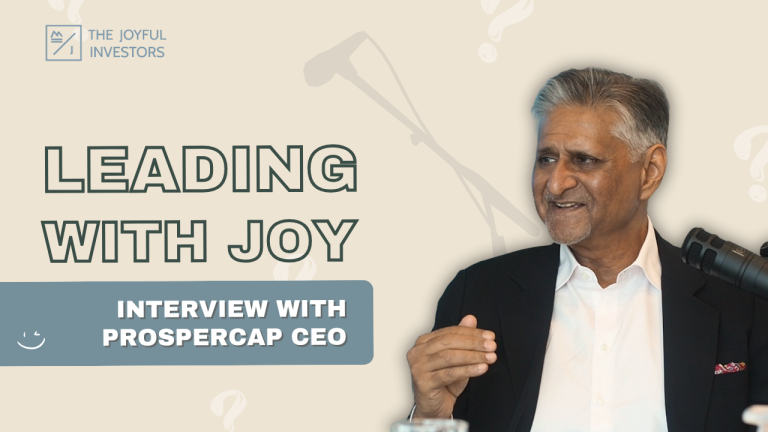
Kathy
in Memos & Musings · 6 min read
What an eventful year we had so far in 2023. The global financial markets experienced an unforeseen rollercoaster ride in the first half of 2023. Following a turbulent 2022 characterized by substantial losses in various asset classes, inflation surges, and swift interest rate increases, retail investors approached 2023 with careful optimism. Fast forward to July 2023, the US markets have demonstrated remarkable strength and have managed to achieve impressive returns despite the prevailing challenges.


Generally things are looking up with the rally continuing for the US markets and has broadened out to companies beyond the tech sector. The June Consumer Price Index (CPI) report from the US, released in July, revealed a 3% annual inflation rate. This marks a consistent decline each month over the past year and is significantly lower than the 9.1 percent recorded a year ago.
For China, the easing of the crackdown has finally (for now) turned the page for the tech stocks especially with a new list of stimulus measures rolled out. These plans encompass strategies to increase consumer demand, bolster the property industry, and enhance investor trust. While we don’t see the sharp rebound in China, the selling pressure seem to be exhausted.
For Singapore’s Real Estate Investment Trusts (S-REITs) sector, the peaking of interest rates is seen as a positive sign. Although the overall sector has not fully recovered yet, specific REITs are demonstrating good performances. One noteworthy example is Keppel DC REIT (AJBU), which manages a portfolio of data centers, has achieved returned 23% year-to-date. Additionally, other REITs subsectors, such as industrial, hospitality and retail, are also showing signs of improvement with single digit positive returns year to date. ✌🏽
We stay reasonably optimistic that as interest rate hikes come to an end which it eventually has to, the borrowing costs will stabilize and this positive trend will eventually extend to other sub-sectors as well. With the S-REITs being able to offer yields roughly twice to that of the Singapore’s 10-year bonds, it is likely to gather sustained interest in this market leading into 2024.
Portfolio Performance
We did not manage to update our portfolio performance exactly at the end of Q2 as we were refining some of our workshop materials after coming back from our Phuket Trip. Nonetheless, let us take a quick look at how our investing portfolio has fared this year so far.
For our growth investing portfolio on US and China markets, we were up by about 80% while the SPDR S&P 500 ETF (SPY) and iShares MSCI China ETF (MCHI) was up by about 17% and 2% respectively as of 4th August 2023. The screenshot below was taken from one of our portfolios at TD Ameritrade with no deposits made this year to this account.
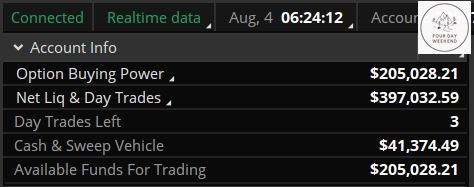

Investment returns are one thing, making the returns with largely quality and sound companies are another. As one may see from our individual entries that contributed to our P/L year to date, these are made up of pretty much large cap firms with solid fundamentals. The returns on investments were not a result of punting on 10x or 20x stocks which could be speculative and not sustainable. Our top conviction ideas like Meta, Adobe and Microsoft which we shared at the end of 2022 with our mentees continued to bear fruit for us as we kick off Q3 2022. Chinese tech companies like Alibaba have also held their ground well. Currently, two of our positions are still under water for now and let’s see what happens at of the year.
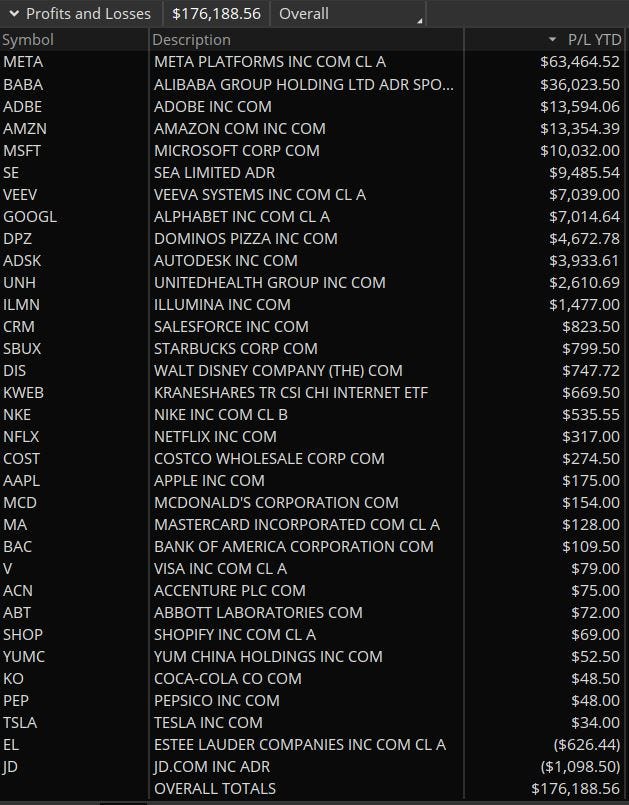

Back home, for dividend investing which we focus solely on Singapore REITs, we managed to grab a screenshot on 30th July 2023 that shows our recent year to date performance is up by 9.3% and 1 year performance which is almost flat at 0.2%. Comparatively, the REITs ETF on average have been up by 2.1% for year to date but down by 7.7% for the 1 year performance.
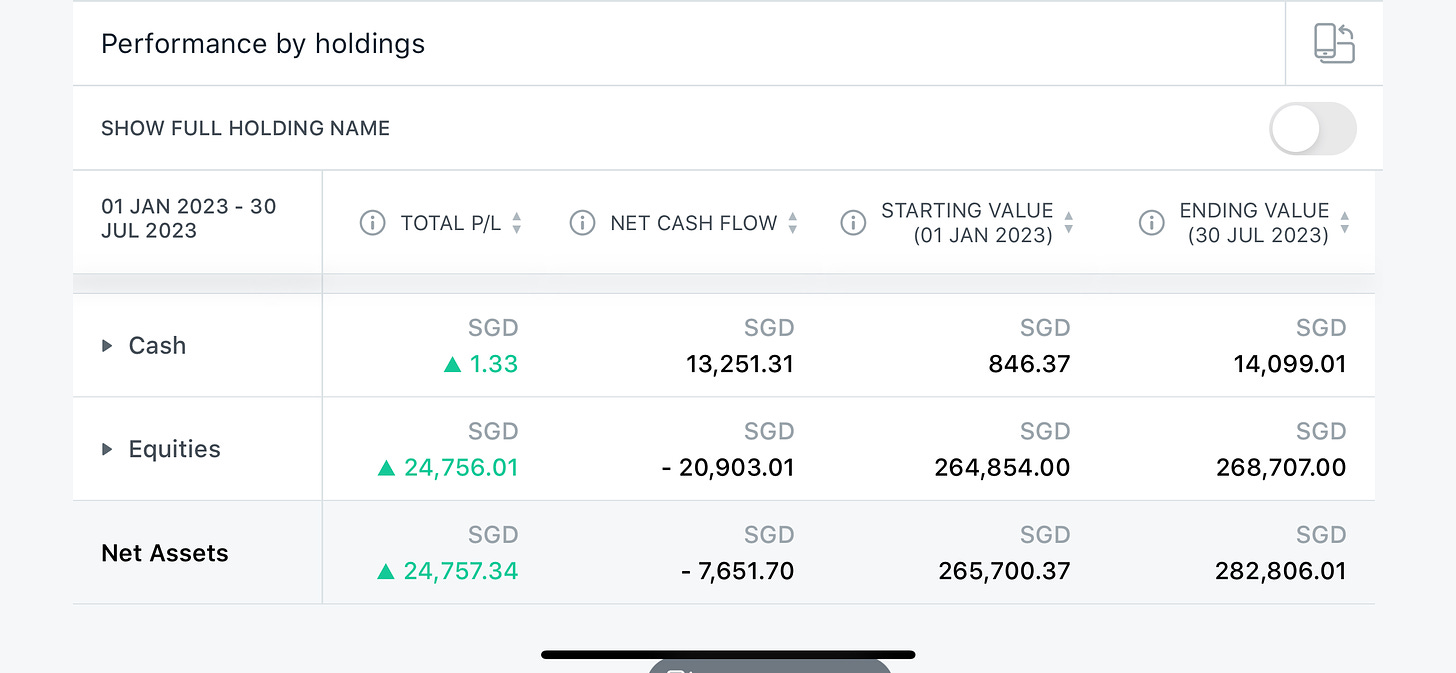

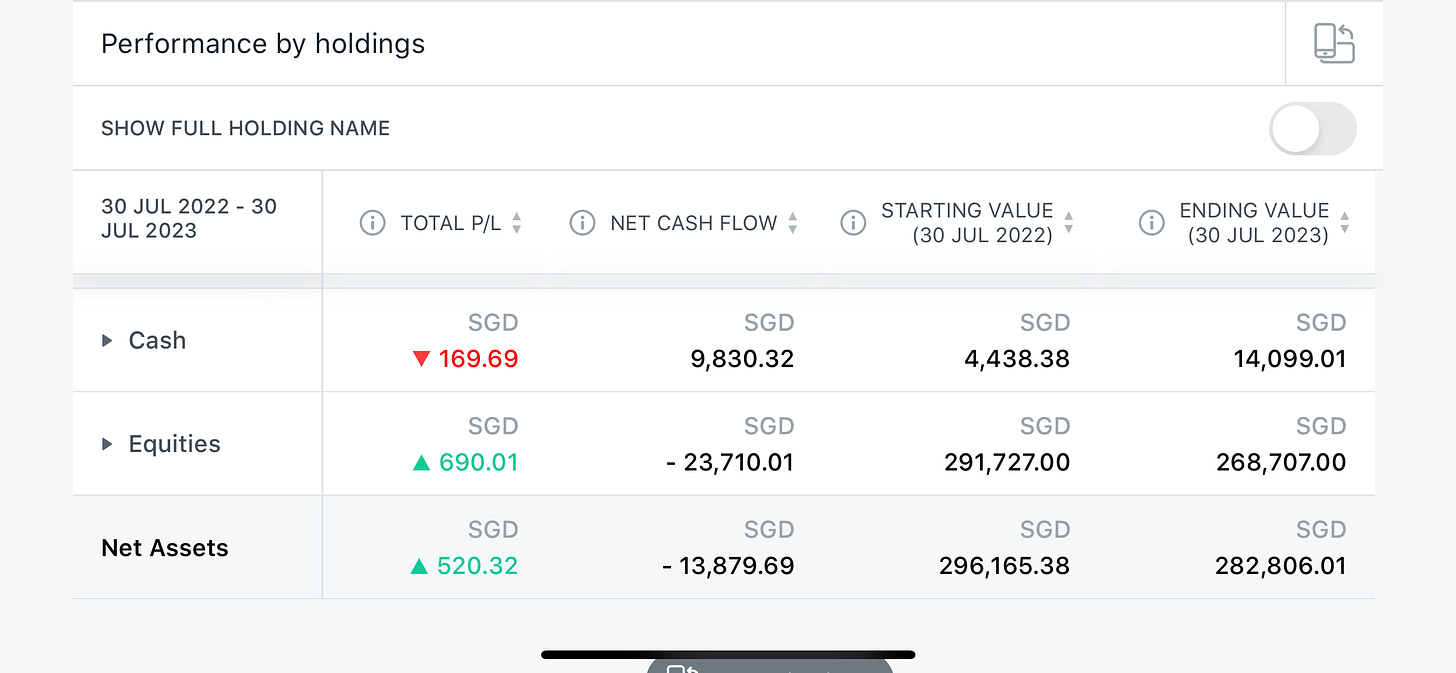

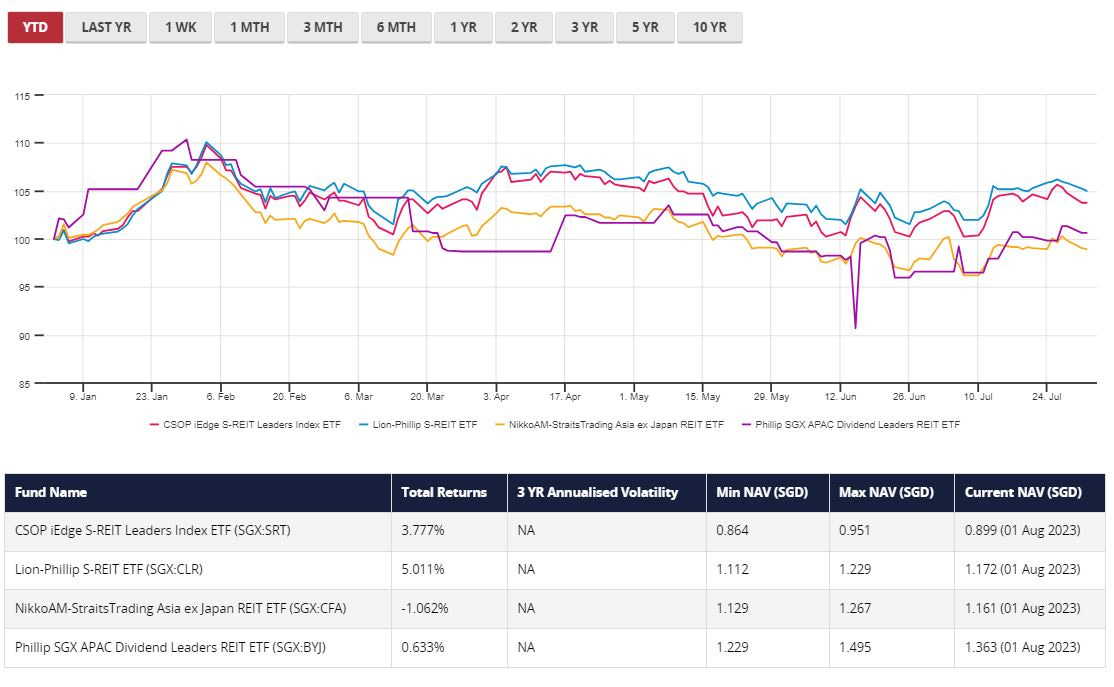

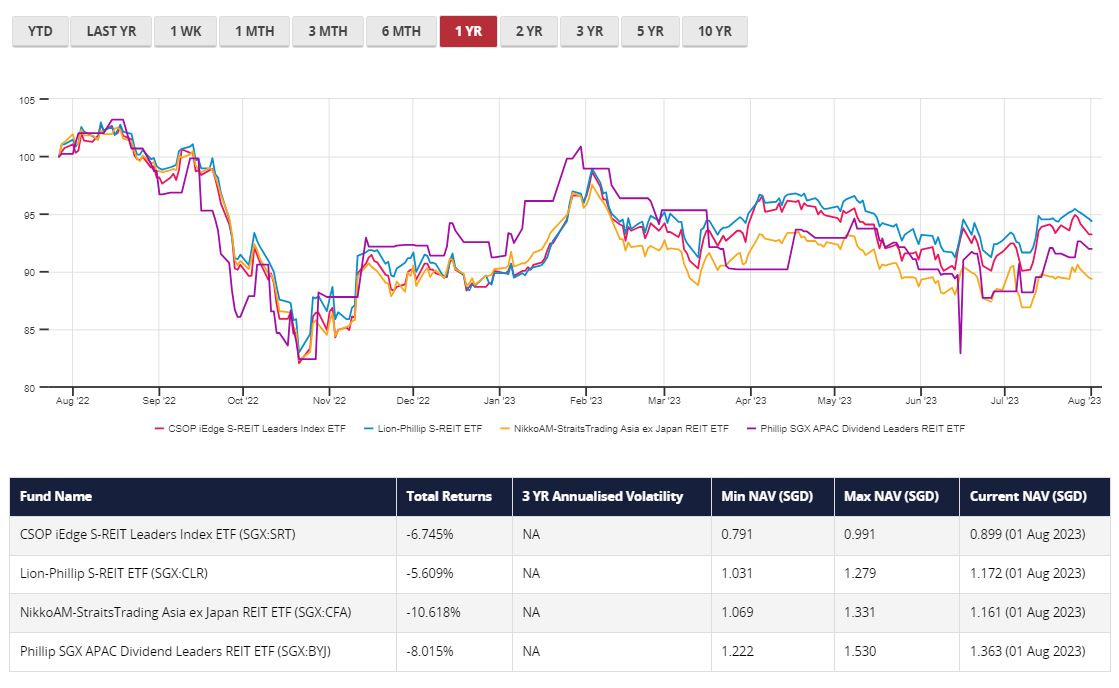

Losing Money Can Be Optional With Options
It is interesting to note that for some stocks such as Dominos Pizza Inc Com (DPZ), which at the end of Q1 was down by 5%, our P/L in Dominos Pizza was positive by $2,945 back then. As Domino Pizza’s price gapped up last month, we continue to make money with a $4,672 gain year to date. We do not need a stock price to go up in order to make money but neither do we want to be losing money if it shot up in price.
Traditionally, most investors including seasoned ones will either long or short a market but that does not offer a favorable risk/reward trade. The correct options strategy in these cases will result in a better risk-adjusted returns instead for an investor. We achieved the same result with UnitedHealth Group (UNH) and a few others too.
(*A word of caution though, do not attempt to deploy options strategy unless you really know what you are doing. This is not to say that options are extremely risky but it is the same as saying you should know how to stay afloat before you jump into the pool because the pool can still be a very dangerous place for someone who can’t swim.)
For investors who are looking to learn how they can increase their portfolio returns and mitigate their downside risks with options, we do offer introductory options workshops that can help with that.
Losing Money Can Also Be Optional Without Options
Yes you read that right. And how do you know it’s true?
Our S-REITs portfolio is a testament to the above statement. There are no call or put options that we can use for SGX with REITs. So what this means is that the only way we were able to outperform the broader REITs ETF is to either be better at picking the right REITs to invest in and also to be able to buy (and sell) them at the right time for the most part. While it was especially challenging to do so given the recent performances of the S-REITs sector as a whole, the right use of fundamental and technical analysis can still provide us with a great deal of edge against most other market participants.
We identify only investable REITs for our portfolio and take a measured approach to constantly add or trim our positions which allow us to ensure that our weighted average cost of our individual positions remain healthy in line with where we are in the market cycles. While it is impossible to time the bottom, it is possible to get it closer and right more often than not when done correctly.
Don’t Let Anyone Tell You That You Can’t Do Something
Finally we would like to end off this portfolio update by saying that if you believe that investing is an endeavor that will last for quite a number of years, do approach it with an open mind. Well-meaning traditional advice like simply buy and hold the index or dollar cost averaging can be helpful to get you started, but to realistically achieve FIRE (i.e. to really retire early) is not an easy feat as it is touted to be. These methods work until they no longer work and rely on an ever upward trajectory at the end. The myth of unyielding compounding where the US market grows positively each year at 10% consistently cannot be taken for granted as well. Investing has always been an intricate dance with uncertainty.
And just because the majority of the people including many active fund managers do not beat the markets doesn’t mean that it cannot be done by retail investors. In fact it is easier for us to do so because we do not have large sums of money to manage and we can keep our fees low. The trick is to be able to understand what are the really critical information to act upon which the majority are neglecting. Perhaps reading books like The Most Important Thing Illuminated: Uncommon Sense For The Thoughtful Investor and Unknown Market Wizards can hopefully get you inspired and believe that it is possible to improve your investing outcomes.


There is a method to all this madness, if you come to learn of it.
With more skills, knowledge and situation awareness, reading the markets can be similar to as how Lionel Messi reads his game. In his own words, “I’ve learned to read the games better, at which moment and where I have to be effective and decisive, and this has been improving over time.”
One good thing about investing, unlike sports such as soccer or others, is that success in investing relies less on innate talent but more on being passionately curious and open-minded, willing to learn and adapt.
Our Overriding Belief
As mentioned in our previous portfolio performance report earlier this year, our Moneyball investing approach aims to take advantage of market opportunities while also withstanding market fluctuations. We’ve observed that our dividend portfolio has remained resilient despite the lackluster performance of the SREITs market. Additionally, it allows us to actively participate in the upside potential of both US stocks during significant rallies and Chinese stocks during gentle rebounds.
That said, every methodology has its peaks and valleys. Although we are committed to investing in a way that performs well in various market conditions, we prioritize discipline and may choose to forgo opportunities that don’t offer a favorable risk/reward ratio. Instead, we prioritize capital preservation in certain situations. This approach may result in temporary underperformance, particularly during times of market exuberance, such as the current state in some parts of the market.
Our objective is not solely to attain the maximum returns, but rather to achieve superior performance while taking on less-than-proportional risk. Outperforming the markets during favorable conditions doesn’t always demonstrate a manager’s skill adequately. The true testament of skill lies in delivering superior performance during challenging times, proving that the gains achieved in good times were a result of skillful decision-making and not just a willingness to accept higher-than-average risk.
On a side note, for those who wish to check out some of the places we visited during our Phuket tour, do subscribe to our new TikTok channel, Four Day Weekend. Here are also some quick action from the final NDP preview this year which you may enjoy. As we approach our nation’s 58th birthday, here’s wishing everyone a good holiday in advance!



About Kathy
Co-Founder of The Joyful Investors and Co-CIO of InvestingNote Portfolio. I graduated with a degree in Economics in National University of Singapore (NUS). My previous experience with traders at the Merrill Lynch enable me to realize many counter-intuitive truths about how the financial markets work and to uncover the challenges faced by many new investors. Investing can be astoundingly simple, and my goal is to make financial education accessible and easy to understand for everyone.
Important Information
This document is for information only and does not constitute an offer or solicitation nor be construed as a recommendation to buy or sell any of the investments mentioned. Neither The Joyful Investors Pte. Ltd. (“The Joyful Investors”) nor any of its officers or employees accepts any liability whatsoever for any loss arising from any use of this publication or its contents. The views expressed are solely the opinions of the author as of the date of this document and are subject to change based on market and other conditions.
The information provided regarding any individual securities is not intended to be used to form any basis upon which an investment decision is to be made. The information contained in this document, including any data, projections and underlying assumptions are based upon certain assumptions and analysis of information available as at the date of this document and reflects prevailing conditions, all of which are accordingly subject to change at any time without notice and The Joyful Investors is under no obligation to notify you of any of these changes.
· · ·
Have you enjoyed this article? We’d be grateful if you would share this useful content to your friends who may benefit from it as well.


